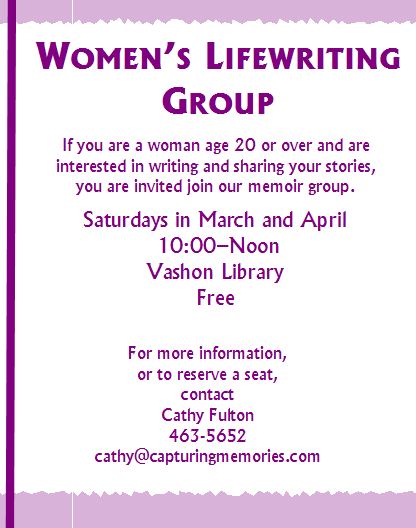(Read Part 1 of this article below, or find it here.)
Once I was convinced that there was a need in the
community for a second writing group in the evenings, I put together a list of
topics that I would feel comfortable presenting to the group. I chose ideas
that I had used to stimulate my own writing. Remember, I only
had to lead a discussion for 10-15 minutes on each one. Other people join the
discussion so I rarely talk for 10 minutes. It is not so much of a lesson as a
discussion of technique. I got my ideas from reading books on memoir writing. Joyce
Delbridge very generously made suggestions and allowed me to use her ideas and
handouts.
 Since I did not want to charge for the “workshops”
as I have come to call them, I needed to find a meeting place that would not
charge for its use. I though this would be the hardest part, but it wasn’t. I
happened to mention that I needed a meeting place to a friend of mine who was also one of the assistants at
the Family History Center where I do my genealogical research. (These centers
are located in Mormon (Church of Jesus Christ of Latter Day Saints) churches
throughout the world.) She suggested that we meet at their church. She even
arranged the room for me through the church organization As it turned out, one
of the criteria for using their facility was that I couldn’t charge for the
meetings! (I can, however, be reimbursed for copying costs of handouts.) It was
just what I needed. Besides, it was a perfect location since genealogical
research and family history writing go hand in hand. Other excellent locations
for lifewriting groups are senior centers and libraries.
Since I did not want to charge for the “workshops”
as I have come to call them, I needed to find a meeting place that would not
charge for its use. I though this would be the hardest part, but it wasn’t. I
happened to mention that I needed a meeting place to a friend of mine who was also one of the assistants at
the Family History Center where I do my genealogical research. (These centers
are located in Mormon (Church of Jesus Christ of Latter Day Saints) churches
throughout the world.) She suggested that we meet at their church. She even
arranged the room for me through the church organization As it turned out, one
of the criteria for using their facility was that I couldn’t charge for the
meetings! (I can, however, be reimbursed for copying costs of handouts.) It was
just what I needed. Besides, it was a perfect location since genealogical
research and family history writing go hand in hand. Other excellent locations
for lifewriting groups are senior centers and libraries.
I created a simple poster to put up around town and wrote
some short newspaper announcements. Before I knew it, I was printing out
handouts for my first meeting.
Since I did not require registration, I had no idea
of how many people would be at the first meeting. The group turned out to have
11 members. A great beginning! If I had had more than 20 people show up, I
would have seriously considered breaking it into two groups so everyone who
would want to read would have an opportunity.
Here are the guidelines I set up. They worked well
for the Senior Center group, so I just duplicated them. Meetings last two hours—exactly. We always end on
time. We spend:
Anyone who wants to read draws a number from a bowl. This determines the order in which we read.
- about 10 minutes getting settled.
- about 30 minutes sharing stories and commenting on them.
- 10 minute break (sometimes).
- 10 to 15 minutes discussing the evening's topic.
- the remainder of the time sharing more readings.
Anyone who wants to read draws a number from a bowl. This determines the order in which we read.
After only three meetings I felt that our group was
a great success! People shared delightful stories about themselves and their
ancestors. Some were humorous, some serious, some heart-rending, but all the
stories were listened to with rapt attention. Comments from group members were
helpful and encouraging. It was obvious that everyone was enjoying the
workshops. I sure was.
The amount of effort I expended in starting the
workshops was really negligible when I consider how much inspiration I am
getting from the group. My family history writing had been waning during the
year I had not been a part of a writing group. Now I was inspired to write
again. It is a great joy to listen to the stories others have to share and I
continued to get ideas from my fellow writers.  Cathy Fulton is the author of Facilitating a Lifewritng Group is Easy,which is packed
with memory-kindlingideas and worksheets for any memoir writing\group. Find
it in the Capturing Memories store, where you can download a free copy of the Table of Contents, Introduction, and Chapter 1.
Cathy Fulton is the author of Facilitating a Lifewritng Group is Easy,which is packed
with memory-kindlingideas and worksheets for any memoir writing\group. Find
it in the Capturing Memories store, where you can download a free copy of the Table of Contents, Introduction, and Chapter 1.

